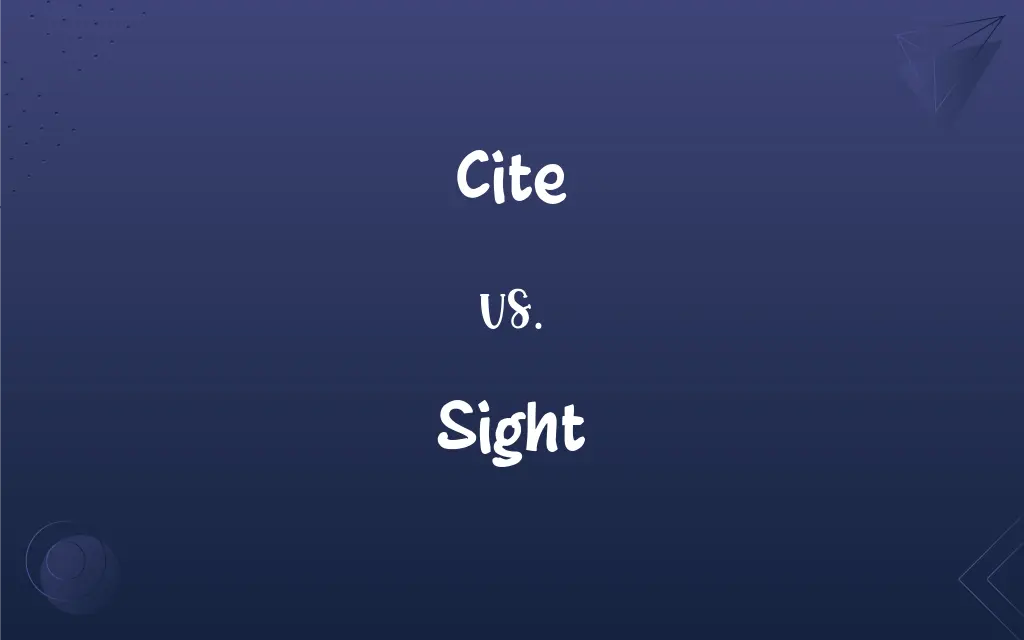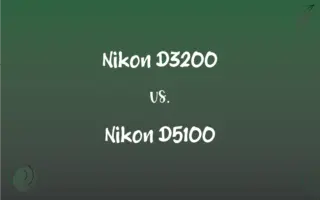Cite vs. Sight: What's the Difference?
Edited by Aimie Carlson || By Janet White || Published on December 21, 2024
Cite involves referencing sources, while sight is related to vision.

Key Differences
Cite refers to the act of quoting or mentioning a piece of information or a source to support an argument or point of view. This is commonly seen in academic, legal, and professional contexts where referencing the work of others is essential for credibility and to avoid plagiarism. On the other hand, sight is one of the five senses and pertains to the ability to see. It involves the process of the eyes detecting light and converting it into signals that the brain interprets as visual images.
In terms of grammar and usage, "cite" is a verb that requires an object (the source or information being cited), while "sight" can function as both a noun (referring to the ability to see or something seen) and a verb (meaning to catch sight of something or to aim a device at a target). The contexts in which these words are used also differ significantly, with "cite" predominantly appearing in academic, legal, and professional discourse, and "sight" being used more broadly in everyday language to refer to visual experiences and observations.
The distinction between "cite" and "sight" also extends to their derivations and related words. "Cite" is related to words like citation, citable, and citing, which all revolve around the act of referencing. "Sight," on the other hand, is associated with words like sighted, sighting, and unsightly, which relate to seeing or appearances.
Understanding the difference between "cite" and "sight" is crucial for effective communication, especially in written contexts where precision and clarity are paramount. Misusing these words can lead to confusion and misunderstandings, highlighting the importance of knowing not only their definitions but also their appropriate contexts and grammatical uses.
Comparison Chart
Part of Speech
Verb
Noun/Verb
ADVERTISEMENT
Definition
To quote or mention a source or piece of information
The ability to see or something that is seen
Context
Academic, legal, professional
General, everyday experiences
Example Usage
"She cited three studies in her paper."
"The sight of the ocean was breathtaking."
Related Terms
Citation, citable
Sighted, sighting, unsightly
Cite and Sight Definitions
Cite
To reference as an authority.
Researchers often cite previous studies to support their hypotheses.
ADVERTISEMENT
Sight
Something seen, a view.
The Grand Canyon is an impressive sight.
Cite
To bring to attention.
The article cited the importance of early education.
Sight
A device on a weapon for aiming.
He aligned the target through the rifle's sight.
Cite
To summon before a court.
The individual was cited for a traffic violation.
Sight
The act of seeing something.
Catching sight of a shooting star is rare.
Cite
To mention in support or proof.
The lawyer cited several cases to argue the precedent.
Sight
The process of making sure something is accurate.
The engineer did a sight check on the machine.
Cite
To commend officially.
The firefighter was cited for bravery.
Sight
The ability to see.
Cite
To quote or refer to (a book or author, for example) as an authority or example in making an argument.
Sight
Field of vision
Out of my sight.
Cite
(Law) To refer to (a previous court decision or other legal precedent), as when arguing a case.
Sight
The act or fact of seeing
Hoping for a sight of land.
Caught sight of a rare bird.
Cite
To mention or bring forward as support, illustration, or proof
Cited several instances of insubordinate behavior.
Sight
Something seen
That bird is a rare sight around here.
Cite
To commend officially for meritorious action in military service.
FAQs
Can you give an example of how to use "cite" in a sentence?
"In her thesis, she cites numerous experts in the field of renewable energy."
What is the meaning of sight in the context of vision?
Sight in the context of vision refers to the ability to see or the act of seeing something.
Can "sight" refer to something other than vision?
Yes, "sight" can also refer to something that is seen, such as a landmark or scene, or the process of sighting something, as in aiming.
How can "cite" be used in legal contexts?
In legal contexts, "cite" can be used to refer to summoning someone to court or referencing legal precedents and documents.
What does it mean to have good sight?
Having good sight means having the ability to see clearly, without significant visual impairment.
What does it mean to cite something?
To cite something means to reference it, especially as an authoritative source or evidence in support of an argument.
How is "sight" used in the context of a device?
In the context of a device, "sight" refers to a mechanism aimed at helping to accurately aim or observe, such as the sight on a rifle.
Is "cite" only used in academic writing?
While "cite" is commonly used in academic writing, it is also used in legal documents, professional reports, and any context where referencing sources is necessary.
What is a citation?
A citation is a reference to a source of information, typically used in academic and professional writing to acknowledge the work of others.
What role does sight play in non-verbal communication?
Sight plays a significant role in non-verbal communication by allowing individuals to interpret gestures, facial expressions, and body language.
What is the significance of sight in daily life?
Sight is crucial for most daily activities, allowing individuals to navigate their environment, recognize people and objects, and perform tasks that require visual input.
Can "cite" be used in informal contexts?
While "cite" is more formal, it can be used informally to refer to mentioning or acknowledging someone's idea or statement.
How has technology impacted the way we cite sources?
Technology has made it easier to cite sources through digital databases, citation management tools, and access to a wide array of online materials.
Can sight be improved?
Sight can sometimes be improved with medical interventions, corrective lenses, or surgery, depending on the underlying condition.
What happens if you don't cite sources in academic work?
Failing to cite sources in academic work can lead to accusations of plagiarism, which is a serious ethical violation.
What are some challenges people with impaired sight face?
People with impaired sight may face challenges in mobility, reading, recognizing faces, and accessing visual information.
What are some common tools to aid sight?
Common tools to aid sight include glasses, contact lenses, magnifying glasses, and telescopes.
How does sight affect perception?
Sight significantly influences perception by providing visual information that the brain interprets, affecting how we understand and interact with the world.
What is the importance of citing sources in research?
Citing sources in research is important for giving credit to original authors, supporting arguments with evidence, and enabling readers to verify information.
How do you properly cite a source?
Proper citation involves following specific formatting guidelines (such as APA, MLA, Chicago) and including all necessary information about the source.
About Author
Written by
Janet WhiteJanet White has been an esteemed writer and blogger for Difference Wiki. Holding a Master's degree in Science and Medical Journalism from the prestigious Boston University, she has consistently demonstrated her expertise and passion for her field. When she's not immersed in her work, Janet relishes her time exercising, delving into a good book, and cherishing moments with friends and family.
Edited by
Aimie CarlsonAimie Carlson, holding a master's degree in English literature, is a fervent English language enthusiast. She lends her writing talents to Difference Wiki, a prominent website that specializes in comparisons, offering readers insightful analyses that both captivate and inform.




































































